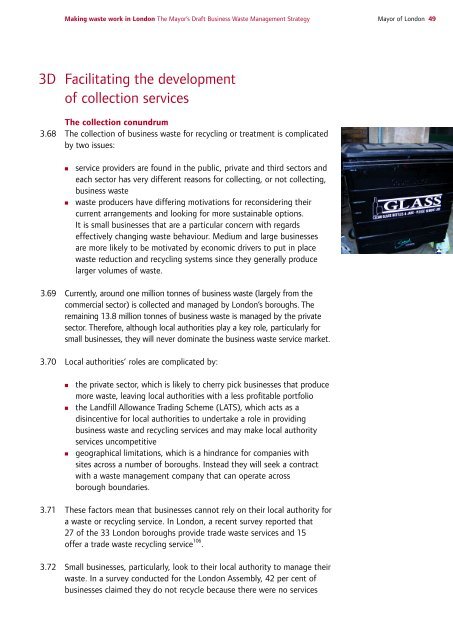Draft Business Waste Strategy PDF - london.gov.uk - Greater ...
Draft Business Waste Strategy PDF - london.gov.uk - Greater ...
Draft Business Waste Strategy PDF - london.gov.uk - Greater ...
You also want an ePaper? Increase the reach of your titles
YUMPU automatically turns print PDFs into web optimized ePapers that Google loves.
Making waste work in London The Mayor’s <strong>Draft</strong> <strong>Business</strong> <strong>Waste</strong> Management <strong>Strategy</strong> Mayor of London 49<br />
3D Facilitating the development<br />
of collection services<br />
The collection conundrum<br />
3.68 The collection of business waste for recycling or treatment is complicated<br />
by two issues:<br />
■ service providers are found in the public, private and third sectors and<br />
each sector has very different reasons for collecting, or not collecting,<br />
business waste<br />
■ waste producers have differing motivations for reconsidering their<br />
current arrangements and looking for more sustainable options.<br />
It is small businesses that are a particular concern with regards<br />
effectively changing waste behaviour. Medium and large businesses<br />
are more likely to be motivated by economic drivers to put in place<br />
waste reduction and recycling systems since they generally produce<br />
larger volumes of waste.<br />
3.69 Currently, around one million tonnes of business waste (largely from the<br />
commercial sector) is collected and managed by London’s boroughs. The<br />
remaining 13.8 million tonnes of business waste is managed by the private<br />
sector. Therefore, although local authorities play a key role, particularly for<br />
small businesses, they will never dominate the business waste service market.<br />
3.70 Local authorities’ roles are complicated by:<br />
■ the private sector, which is likely to cherry pick businesses that produce<br />
more waste, leaving local authorities with a less profitable portfolio<br />
■ the Landfill Allowance Trading Scheme (LATS), which acts as a<br />
disincentive for local authorities to undertake a role in providing<br />
business waste and recycling services and may make local authority<br />
services uncompetitive<br />
■ geographical limitations, which is a hindrance for companies with<br />
sites across a number of boroughs. Instead they will seek a contract<br />
with a waste management company that can operate across<br />
borough boundaries.<br />
3.71 These factors mean that businesses cannot rely on their local authority for<br />
a waste or recycling service. In London, a recent survey reported that<br />
27 of the 33 London boroughs provide trade waste services and 15<br />
offer a trade waste recycling service 106 .<br />
3.72 Small businesses, particularly, look to their local authority to manage their<br />
waste. In a survey conducted for the London Assembly, 42 per cent of<br />
businesses claimed they do not recycle because there were no services
















